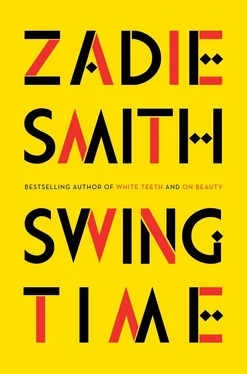Just as if I’d asked why it was light outside and been told: “It’s daytime!”
Seven
All we had was her name, we found it in the credits. Jeni LeGon. We had no idea where she’d come from, if she was alive or dead, if she’d made any other films, we had only these four minutes from Ali Baba —well, I had them. If Tracey wanted to watch them she had to come round, which she began to do, every now and then, like Narcissus bending over a pool of water. I understood it wouldn’t take her long to learn the whole routine — excepting the impossible lean — but I wasn’t going to give her the video to take home, I knew better than that, I knew when I had collateral. And I had begun to spot LeGon here and there, bit parts in movies I’d seen many times. There she was as a maid to Ann Miller, wrestling with a baby pug, and as a tragic mulatto, dying in the arms of Cab Calloway, and once more a maid, helping Betty Hutton get dressed. These discoveries, widely spaced, sometimes many months apart, became a reason to call Tracey, and even if her mother answered Tracey would come round right away, with no hesitation or excuses. She sat inches from the television screen, ready to point out this or that moment of action or expression, an emotion passing over Jeni’s face, a variation in one step or another, and interpreting everything she saw with that sharpness of insight I felt I lacked, that I considered, at this point, Tracey’s possession alone. A gift for seeing that seemed to have its only outlet and expression here, in my living room, in front of my television, and which no teacher ever saw, and no exam ever managed to successfully register or even note, and of which, perhaps, these memories are the only true witness and record.
• • •
One thing she failed to notice, and I didn’t want to tell her: my parents had broken up. I only knew it myself because my mother told me it was so. They still lived in the same flat and slept in the same room. Where else could they go? Real divorces were for people who had lawyers and new places to live. There was also the question of my mother’s capabilities. We all three knew that in divorces the father left, but my father could not leave, there was no question of that. Who, in his absence, would tape up my knee when I fell, or remember when my medicine was to be taken, or calmly comb the nits out of my hair? Who would come to me when I had my night terrors? Who would wash my stinking, yellow sheets the next morning? I don’t mean that my mother didn’t love me but she was not a domestic person: her life was in her mind. The fundamental skill of all mothers — the management of time — was beyond her. She measured time in pages. Half an hour, to her, meant ten pages read, or fourteen, depending on the size of the type, and when you think of time in this way there isn’t time left for anything else, there’s no time to go to the park or get ice cream, no time to put a child to bed, no time to listen to the teary recounting of a nightmare. No, my father could not leave.
One morning when I was brushing my teeth my mother walked into the bathroom, sat on the rim of our avocado bathtub and euphemistically outlined the new arrangement. At first I could hardly understand her, she seemed be taking a very long time to get to the point of whatever she really wanted to say, speaking of child-psychology theories, and “places in Africa” where children were raised not by their parents but “by a village,” and other matters I either didn’t understand or didn’t care about, but finally she pulled me to her, hugged me very tightly and said, “Your dad and me — we’re going to live as brother and sister.” I can remember thinking this was the most perverse thing I’d ever heard: I was to be left an only child, while my parents became siblings to each other. My father’s initial reaction must have been similar, because for several days after that it was warfare in the flat, all-out warfare, and I had to sleep with two pillows pressed to my ears. But when he at last understood that she was not joking, that she would not change her mind, he fell into a depression. He began to spend whole weekends on the sofa, watching television, while my mother kept to the kitchen and to her high stool, busy with the homework for her degree. I went to dance class alone. I ate my tea with one or the other of them, no longer with both.
A little while after my mother’s announcement my father made a baffling decision: he went back to delivering the post. It had taken him ten years to become a Delivery Office Manager but in his sadness he read Orwell’s Coming Up for Air and this novel had convinced him that he’d be better off doing “honest labor,” as he put it — and have the rest of his days free to “get the education he never had”—than work at a soulless desk job that used up all his time. It was the kind of impractical, high-principled action that my mother usually appreciated, and the timing of the announcement did not seem, to me, accidental. But if winning her back was his plan it didn’t work: he rose once again each morning at three and returned at one in the afternoon, often ostentatiously reading some sociological textbook nicked from my mother’s shelves, but although my mother respectfully asked after his morning’s work and occasionally after his reading, she did not fall back in love with him. After a while they stopped talking to each other altogether. The weather in the flat changed. In the past I had always had to wait for one of the rare gaps in my parents’ decade-long argument, into which I would then try to insert myself. Now I could speak without interruption, if I wanted, to either of them, but it was already too late. In the fast-forward style of city childhoods, they were no longer the most important people in my life. No, I really didn’t care what my parents thought of me any longer. Only my friend’s judgment counted, now more than ever, and sensing this, I suspect, more and more she chose to withhold it.
Eight
It was said later that I was a bad friend to Aimee, always had been, that I was only waiting for the right moment to hurt her, even to ruin her. Maybe she believes that. But it’s a good friend who wakes a friend from her dream. At first I thought that it wouldn’t have to be me at all, that the village itself would wake her up, because it didn’t seem possible to stay dreaming in that place or to think of yourself as in any way an exception. I was wrong about that. On the northern outskirts of the village, beside the road that led to Senegal, there stood a large pink brick house of two stories — the only one of its kind for miles around — abandoned, but basically finished except for the windows and doors. It had been built on remittances, Lamin told me, sent back by a local young man who had been doing well, driving a cab in Amsterdam, until his luck changed and the money abruptly stopped. Now the house, empty for a year, would have a new life as our “base of operations.” By the time we reached it the sun was going down, and the Minister for Tourism was pleased to show us the bare bulbs burning from the ceiling of each room. “And every time you visit,” we were told, “it will be only better and better.” The village had been waiting for light a long time — since the coup, over twenty years earlier — yet in a couple of days Aimee had managed to convince the relevant authorities to attach a generator to this shell of a house, and there were sockets to charge all our phones and a team of workmen had affixed Perspex windows and put in serviceable MDF doors, beds for everybody and even a stove. The children were thrilled — it was like camping — and for Aimee the two nights she was scheduled to spend here took the form of an ethical adventure. I heard her tell the Rolling Stone reporter how important it was to stay “in the real world, among the people,” and the next morning, alongside the formal photographed events — soil-breaking, schoolgirls dancing — many images were taken of Aimee in this real world, eating from the communal bowls, crouching down with ease alongside the women — using the muscles she had developed indoor-cycling — or showing off her agility, climbing the cashew trees with a group of young boys. After lunch, she put on her olive cargo pants and together we toured the village with the woman from DfID, whose task it was to point out “areas of particular deprivation.” We saw drop toilets crawling with hookworm, a forgotten, half-constructed clinic, many airless rooms with corrugated-iron roofs in which children slept ten to a bed. Afterward we toured the communal gardens — to witness the “limits of subsistence farming”—but as we entered the field the sun happened to be casting long, captivating shadows and the potato plants were hugely bushy and green and the trees looped with vines, the lushness of everything creating an effect of extraordinary beauty. The women, young and old, had a utopian look to them, in their colorful wrappers, pulling weeds from the ground, chatting to each other as they worked, shouting across the rows of peas or peppers, laughing at each other’s jokes. Spotting us approaching, they straightened up and wiped the sweat from their faces, with their own headscarves, if they wore them, with their hands if not.
Читать дальше












